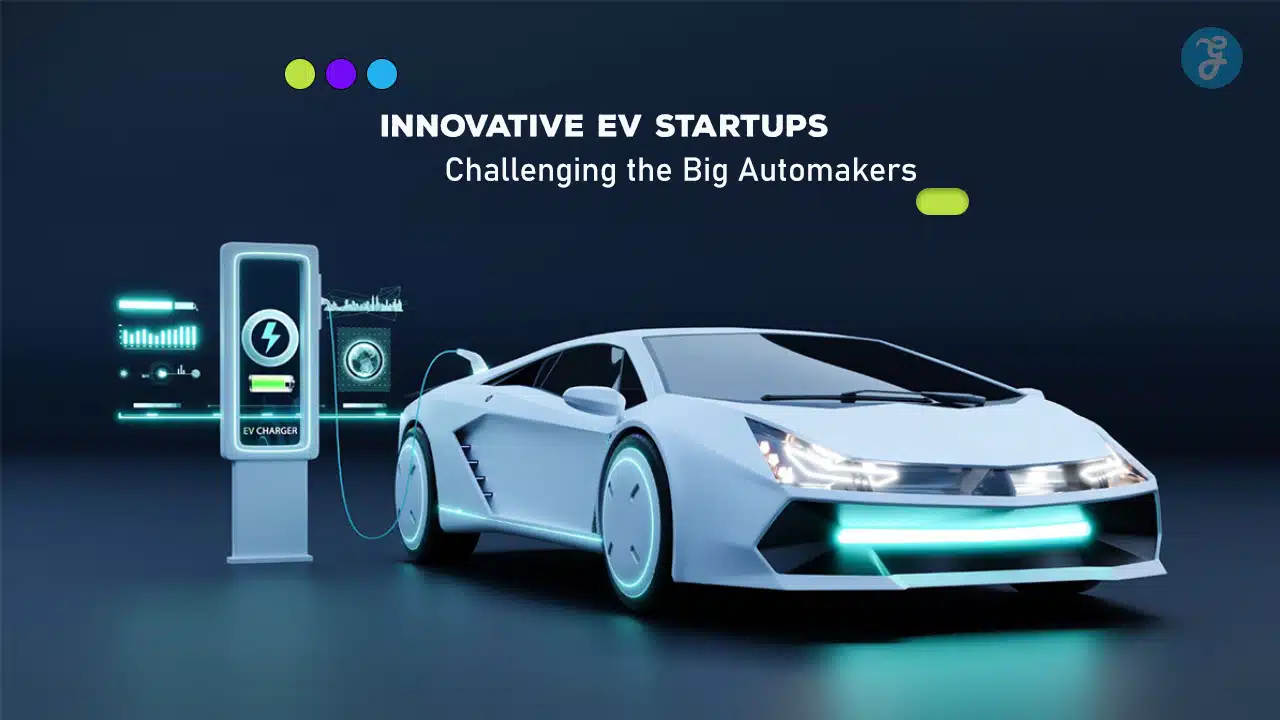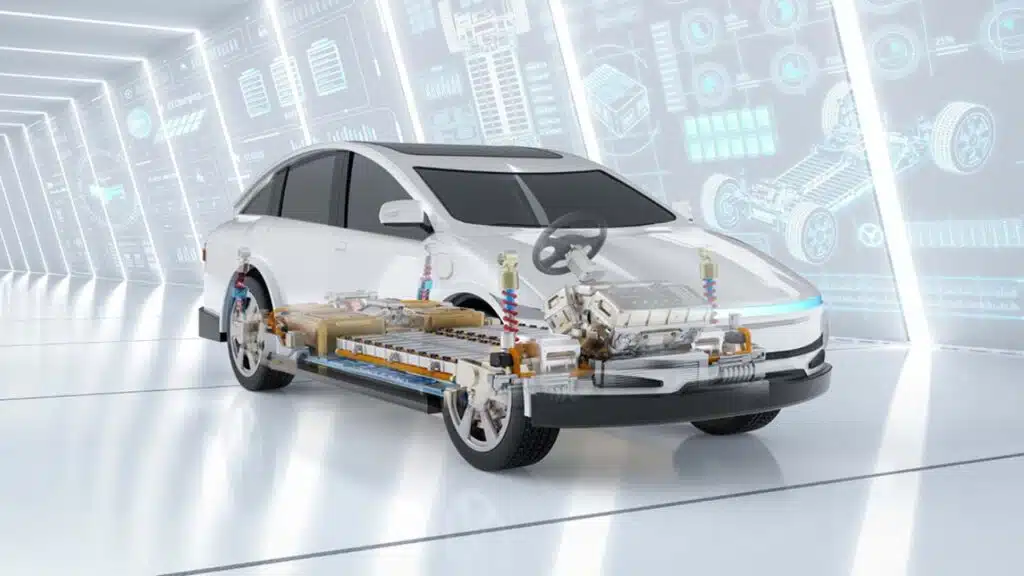As the electric vehicle (EV) revolution accelerates, the auto industry has seen an influx of new players eager to challenge the dominance of traditional automakers.
These EV startups are pushing the boundaries of technology, design, and sustainability, offering unique approaches to electric mobility.
While giants like Tesla, General Motors, and Ford are leading the EV charge, these startups are introducing innovative concepts that are transforming how we think about electric vehicles.
In this article, we explore 12 innovative EV startups that are making waves in the industry, challenging the big automakers with their cutting-edge technology, sustainable practices, and visionary designs.
1. Rivian
Founded in 2009 by RJ Scaringe, Rivian has quickly become one of the most exciting names in the electric vehicle market.
Focusing on adventure-oriented vehicles, Rivian offers two models: the R1T electric pickup truck and the R1S electric SUV.
Rivian is also developing electric delivery vans in collaboration with Amazon, one of its major investors.
What Makes It Innovative:
- Adventure-focused design:
Rivian vehicles are designed for off-road performance, appealing to outdoor enthusiasts.
- Quad-motor system:
Rivian’s electric trucks feature a quad-motor system, allowing each wheel to have independent control for enhanced handling in rough terrain.
- Unique battery pack technology:
Rivian’s battery packs are designed for high energy density and longevity, allowing for extended range even in rugged conditions.
Impact:
Rivian is directly challenging traditional automakers like Ford and Chevrolet in the truck and SUV segments, offering an electric alternative to gas-guzzling off-road vehicles.
2. Lucid Motors
The 2007-founded Lucid Motors, under the direction of CEO Peter Rawlinson (previous Chief Engineer of Tesla’s Model S), specializes in high-end electric vehicles.
Lucid’s flagship model, the Lucid Air, is a luxury sedan designed to compete with Tesla’s Model S and other premium vehicles from brands like Mercedes and BMW.
What Makes It Innovative:
- Unrivaled range:
The Lucid Air boasts an impressive EPA-rated range of up to 520 miles, setting a new benchmark for EV range.
- Luxury meets performance:
The Air combines high-end materials and cutting-edge technology with powerful performance, featuring up to 1,111 horsepower in its top variant.
- Advanced charging system:
Lucid’s proprietary charging technology allows for rapid charging, adding up to 300 miles of range in just 20 minutes.
Impact:
Lucid is raising the bar for luxury EVs, challenging traditional luxury automakers with its combination of range, performance, and premium design.
3. Fisker Inc.
Henrik Fisker, the well-known designer behind iconic vehicles like the Aston Martin DB9, founded Fisker Inc., which is making a comeback with the Fisker Ocean, a fully electric SUV that emphasizes sustainability.
Fisker’s goal is to create the world’s most sustainable vehicles through innovative manufacturing processes and eco-friendly materials.
What Makes It Innovative:
- Sustainability focus:
The Ocean features a fully vegan interior and uses recycled materials like plastics reclaimed from the ocean.
- Flexible lease model:
Fisker offers a unique subscription-based leasing model, allowing consumers to lease the Ocean with no long-term commitment.
- Solar roof:
The Ocean comes with an optional solar roof, designed to increase range by capturing energy from the sun.
Impact:
By integrating sustainability into every aspect of its vehicles, Fisker is challenging both traditional and electric automakers to rethink their environmental impact.
4. Canoo
Canoo, founded in 2017, takes a unique approach to vehicle design, focusing on a “post-SUV” world.
Canoo’s electric vehicles are built on a proprietary “skateboard” platform, which houses all of the car’s critical components and allows for maximum design flexibility.
Canoo plans to release multiple vehicles, including a lifestyle vehicle, a delivery vehicle, and a pickup truck.
What Makes It Innovative:
- Modular design:
Canoo’s skateboard platform allows for easy swapping of different vehicle bodies, providing flexibility for various use cases.
- Subscription model:
Canoo is focusing on a subscription-based ownership model, allowing users to subscribe to vehicles on a month-to-month basis.
- Minimalist, functional design:
Canoo’s vehicles feature a minimalist design with maximum interior space, focusing on functionality and user experience.
Impact:
Canoo’s modular and subscription-based approach is disrupting the traditional car ownership model, offering flexibility and affordability in the EV market.
5. Arrival
Founded in 2015, Arrival is a UK-based startup focused on electric commercial vehicles, particularly delivery vans and buses.
Arrival’s mission is to make electric transportation affordable for businesses and municipalities.
Hyundai and UPS are among the company’s major investors, and it is developing “microfactory” production methods.
What Makes It Innovative:
- Microfactories:
Instead of building large, centralized production facilities, Arrival creates smaller, localized microfactories that can be set up close to demand centers, reducing transportation costs and emissions.
- Cost-effective vehicles:
Arrival’s goal is to make electric commercial vehicles at the same price as traditional internal combustion engine vehicles, significantly reducing the cost barrier for adoption.
- Scalable design:
Arrival’s modular vehicle design allows for easy scalability and customization based on customer needs.
Impact:
Arrival is revolutionizing the commercial EV sector, directly competing with traditional manufacturers in the delivery van and bus markets by offering cost-effective, scalable solutions.
6. NIO
Founded in 2014, NIO is one of China’s leading electric vehicle startups.
NIO specializes in premium electric vehicles and is known for its battery-swapping technology and focus on high-end performance.
NIO’s current lineup includes luxury SUVs and sedans like the ES8, ES6, and EC6.
What Makes It Innovative:
- Battery-swapping technology:
NIO’s battery-swapping stations allow drivers to exchange depleted batteries for fully charged ones in just minutes, eliminating long charging times.
- Autonomous driving:
NIO is heavily investing in autonomous driving technology, aiming to offer vehicles with full self-driving capabilities in the near future.
- NIO Power:
NIO offers a range of power services, including mobile charging trucks, battery rentals, and home charging solutions.
Impact:
NIO’s focus on premium electric vehicles, combined with innovative battery-swapping technology, positions it as a serious competitor to global luxury automakers like Tesla and Audi.
7. BYTON
BYTON, a Chinese-German EV startup, was founded in 2016 with a focus on intelligent electric vehicles.
BYTON’s first model, the M-Byte, is an electric SUV that emphasizes digital connectivity and cutting-edge infotainment systems.
BYTON aims to create a “smart device on wheels” by integrating advanced digital technology with EV performance.
What Makes It Innovative:
- 48-inch dashboard screen:
The M-Byte features an industry-leading 48-inch touchscreen dashboard, offering an immersive infotainment experience.
- Autonomous capabilities:
BYTON is developing autonomous driving features, aiming to offer a fully connected, self-driving experience in the future.
- Sustainability: BYTON incorporates sustainable materials in its vehicle designs and is focused on reducing the environmental impact of its production processes.
Impact:
BYTON is challenging traditional automakers by focusing on the convergence of electric mobility and digital technology, aiming to redefine the driving experience.
8. Polestar
Polestar, originally the performance division of Volvo, became a standalone electric vehicle brand in 2017.
Co-owned by Volvo and Geely, Polestar aims to produce high-performance electric vehicles with a focus on Scandinavian design and sustainability.
Its current lineup includes the Polestar 2, a premium electric sedan, and the upcoming Polestar 3 SUV.
What Makes It Innovative:
- Minimalist design:
Polestar vehicles are known for their clean, minimalist design, with a focus on sustainability and high-quality materials.
- Sustainable manufacturing:
Polestar is committed to reducing its carbon footprint, using recycled materials and aiming for full climate neutrality by 2030.
- Android Automotive OS:
Polestar 2 is one of the first vehicles to feature Google’s Android Automotive OS, offering seamless integration with Google apps and services.
Impact:
Polestar is carving out a niche in the premium electric vehicle market, challenging Tesla and other luxury automakers with its blend of performance, design, and sustainability.
9. Xpeng Motors
Founded in 2014, Xpeng Motors is another major player in China’s electric vehicle market.
Xpeng offers a range of electric sedans and SUVs, including the P7 and G3, both of which emphasize advanced technology, such as autonomous driving and smart connectivity features.
What Makes It Innovative:
- Autonomous driving technology:
Xpeng has developed its own autonomous driving system, XPILOT, which offers advanced features like highway driving assist and automatic parking.
- OTA updates:
Xpeng’s vehicles receive over-the-air software updates, ensuring that drivers always have access to the latest features and improvements.
- Smart connectivity:
Xpeng vehicles feature AI-powered voice control and advanced infotainment systems, offering a tech-forward driving experience.
Impact:
Xpeng is positioning itself as a leader in smart, connected electric vehicles, challenging traditional automakers with its focus on cutting-edge technology.
10. Faraday Future
Founded in 2014, Faraday Future is an American EV startup with global ambitions.
Despite facing financial challenges in its early years, Faraday Future is pushing forward with the development of the FF 91, a luxury electric SUV designed to compete with Tesla and other high-end electric vehicle manufacturers.
What Makes It Innovative:
- Advanced technology:
The FF 91 boasts a range of over 300 miles, a 0-60 mph time of under 3 seconds, and a suite of autonomous driving features.
- Luxurious design:
The FF 91 offers a futuristic, tech-filled cabin with features like zero-gravity seats, an intelligent infotainment system, and high-end materials.
- Personalized driving experience:
Faraday Future’s vehicles are designed to learn and adapt to the preferences of individual drivers, offering a personalized user experience.
Impact:
Faraday Future is aiming to disrupt the luxury electric vehicle market with its technologically advanced and luxurious FF 91, challenging established brands like Tesla and Mercedes-Benz.
11. Lordstown Motors
Founded in 2018, Lordstown Motors focuses on producing electric pickup trucks for the commercial fleet market.
Its flagship model, the Endurance, is designed to be a tough, reliable work truck with the efficiency and cost savings of electric power.
Lordstown Motors is positioning itself as a competitor to traditional truck manufacturers like Ford and Chevrolet.
What Makes It Innovative:
- Electric work truck:
The Endurance is one of the first electric pickup trucks aimed specifically at commercial fleets, offering a cost-effective solution for businesses looking to reduce their carbon footprint.
- Hub motor technology:
The Endurance features a hub motor design, where the motors are located in the wheels, allowing for fewer moving parts and increased efficiency.
- Focus on commercial fleets:
Lordstown is targeting businesses with large fleets, offering them long-term savings on fuel and maintenance.
Impact:
Lordstown Motors is directly challenging traditional truck manufacturers by offering an electric alternative to the popular work truck segment, making it a key player in the EV market for commercial vehicles.
12. Bollinger Motors
Founded in 2014 by Robert Bollinger, Bollinger Motors is focused on producing all-electric off-road vehicles.
The company’s flagship models, the B1 SUV and B2 pickup truck, are designed for rugged performance and utility, offering a fully electric alternative to traditional off-road vehicles like the Jeep Wrangler or Ford Bronco.
What Makes It Innovative:
- Rugged design:
Bollinger’s vehicles are built with off-road enthusiasts in mind, featuring a boxy, utilitarian design that prioritizes function over form.
- Class-leading capability:
The B1 and B2 are designed to handle extreme off-road conditions, with features like 15 inches of ground clearance, 10,001 pounds of towing capacity, and a dual-motor all-wheel-drive system.
- Modular construction:
Bollinger’s vehicles are highly modular, allowing for easy customization and conversion for different use cases, from work trucks to adventure vehicles.
Impact:
Bollinger Motors is challenging the traditional off-road vehicle market by offering an electric alternative that combines rugged performance with sustainability, appealing to both environmentalists and adventure seekers.
Final Thoughts
The electric vehicle revolution is well underway, and these 12 startups are playing a crucial role in shaping the future of mobility.
From luxury sedans to rugged pickup trucks and innovative business models, each of these companies is challenging the traditional automakers in their own way.
Whether through cutting-edge technology, sustainable design, or entirely new ownership models, these EV startups are pushing the boundaries of what’s possible in the automotive industry.
As the demand for electric vehicles continues to grow, these startups are likely to become major players in the market, offering consumers a wider range of choices and accelerating the shift towards a cleaner, more sustainable future.






































